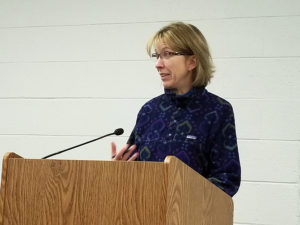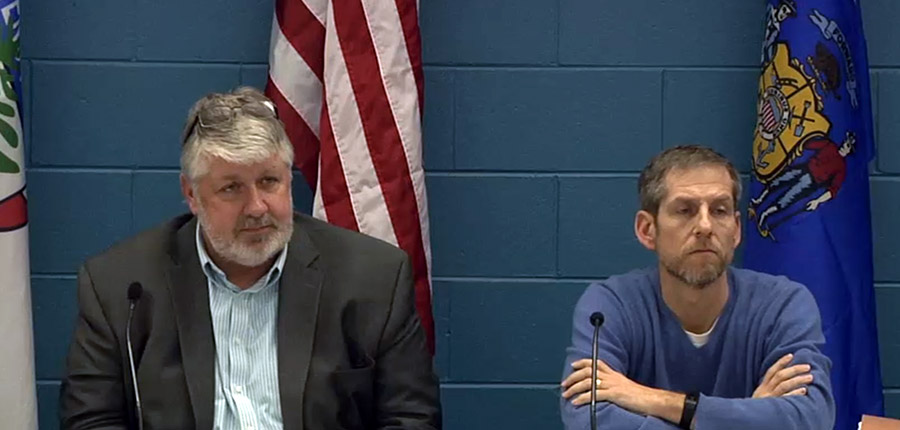Council abandons BPAC’s chosen vendor for bike lanes; turns to SEH
By Brandi Makuski
Two hours of discussion on Monday made fruitless two months of negotiations city engineers had been conducting for the design of a bicycle path network across the city.
After about eight weeks of mediated negotiations between the city and Milwaukee-based Toole Design Group, the board of public works on Jan. 29 voted to switch vendors for the design phase, due to Toole’s unexpected high cost estimates for three project variations the company submitted. Those estimates, and the proposal specifics, were discussed in closed session and not available to the public.
Toole was hired last October to design the nearly 14 miles of bicycle lanes, funded largely by a $391,000 federal grant applied for the by city’s bicycle and pedestrian advisory committee. Under the terms of the grant, the city is responsible for matching 20 percent of those funds.
But making the change wasn’t easy. The board’s vote needed final approval during a special meeting of the full city council immediately following, and that’s where the conversation took an unusual turn.
Some on the council said they would have preferred additional time to consider the initial proposals submitted, even though Scott Beduhn, director of public works, said council members have had access to the proposals since they were delivered to the city last September. Some also continued to argue in favor of keeping Toole, with Council President Meleesa Johnson saying SEH was “well-qualified” but more of a “general contractor”.
A council vote on the board’s decision to dissolve talks with Toole failed by a vote on 4-6, with alders Tori Jennings, Cindy Nebel, Johnson, Mary Kneebone, Cathy Dugan and Mary McComb voting against, with most casting their vote after a lengthy pause. Council members David Shorr, Mike Phillips, Jeremy Slowinski and Shaun Morrow voted to approve the board’s decision of switching vendors. Ald. Heidi Oberstadt was excused from the meeting.
The vote put the city in a tough spot, Wiza said, and nowhere to go without a new motion. Any delay, he said, would adversely affect the project’s timeline and place the entire grant in jeopardy.
After asking the council to make another motion, Jennings made an unexpected move the council approve funding Toole for it’s middle-cost proposal “up to $81,000”, tipping the city’s hand with what is traditionally private financial information for the sake of competitive bargaining purposes.
“I would caution everyone from using dollar amounts because we don’t know what’s going to pass yet,” Wiza replied. “We have three proposals [from Toole]; and it’s my understanding Alderperson Jennings was choosing the middle proposal.”
City Attorney Andrew Beveridge said his main concern for Jennings’ motion involved the city’s ability to pay for it’s share of Toole’s proposal.
City records show $55,000 has been earmarked for the city’s share of the funding. Anything beyond that, Beveridge said, may need to come from the city’s contingency fund, or require a budget adjustment—both moves requiring super-majority approval of the council.

Before the vote, Jennings made a statement underlining her belief she was acting responsibly by supporting continued work with Toole.
“I do not believe this is being reckless with taxpayer dollars in any way because I think it is essential that this design be done extremely well, because this design that’s being used is what will go into the future on these roads; even when they’re re-striped, they’re re-striped according to the design that is laid down,” Jennings said. “And to use taxpayer money on an inferior product, to me, is a waste of taxpayer money…I think at times government is guilty of doing things on the cheap to save money up front, and then they spend way more money down the road. I’m very caution about that, and I just wanted to express that I do not in any way feel like I’m putting this forward and being careless with taxpayer dollars. On the contrary, that’s what I’m looking out for.”
Johnson said she felt “uncomfortable” taking the extra money from contingency only one month into the year. Nebel said she agreed Toole’s estimate of $81,000 was a lot of money, but, “not as intimating as what we first saw”, also adding with any company besides Toole, Beduhn would need to be “constantly be looking over the shoulders of another company”.
Beduhn later refuted that statement, saying he felt “totally confident” in using SEH, and noting the company had a long track record of working not only with the city, but a successful past with grant guidelines.
The council’s second vote, one to approve working with Toole up to $81,000, failed, with only McComb, Dugan, Kneebone, Nebel and Jennings voting in favor.
“I feel the need to say something,” Wiza said after the second failed vote. “When the group charged with evaluating who should do the design work, they used a set of criteria. Toole and SEH came in as a tie. Because they were so very close in their ranking, it wasn’t as big a deal when the council chose go to with Toole. Because time is a factor in these projects, we tried to negotiate with Toole as best we could, but it came in significantly over what the grant allows. Anything over that amount, the city is responsible for 100 percent. Because we tried and were unable to successfully negotiate within the grant parameters, even thought the director went back to them a couple of times. The reason we’re having a special meeting to night is because further delays could derail the project.”
Ald. Jeremy Slowinski said Beduhn’s stamp of approval is all the council should need in approving SEH.
“When I was elected, that is one of my duties, to get the most bang for my constituent’s buck,” Slowinski said. “We’re spending more money for less with Toole versus SEH, which is a reputable company. I’m not understanding this, I don’t get it.”
Several suggestions were floated regarding a new vote, or holding another special meeting in the near future, before Beveridge said the council was allowed to temporarily suspend its meeting rules so Jennings could reword her motion and the council could vote again.
Jennings acquiesced.
“Democracy is a messy thing; we’ve had two failed votes. I’ve invested a lot in this TAP grant…I fully know time is critical here. I know these grants can be lost,” she said, adding she’d agree to move the city begin negotiations with SEH because “the most important thing is to continue”.
The motion finally passed, this time unanimously.

